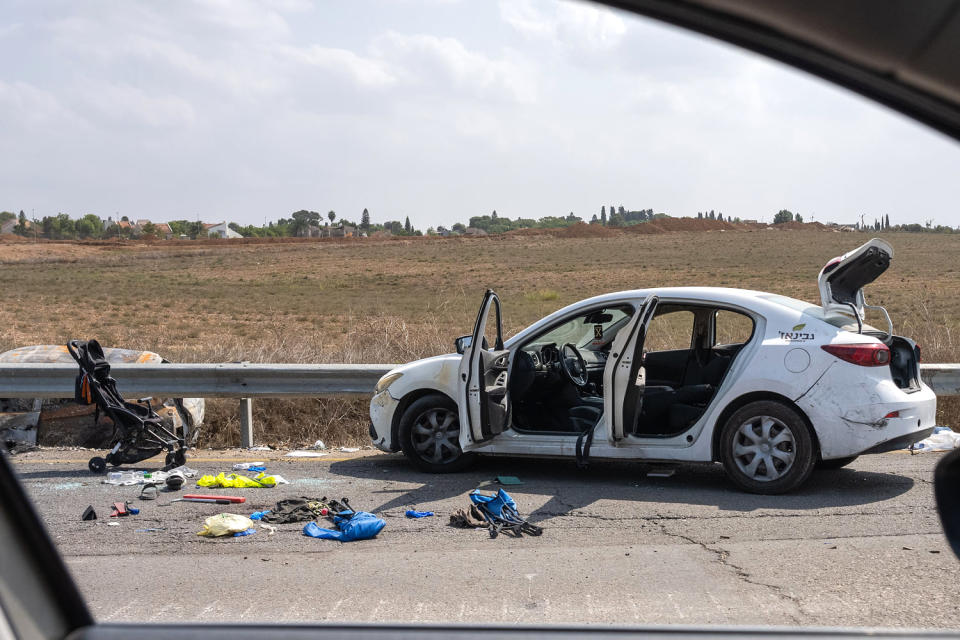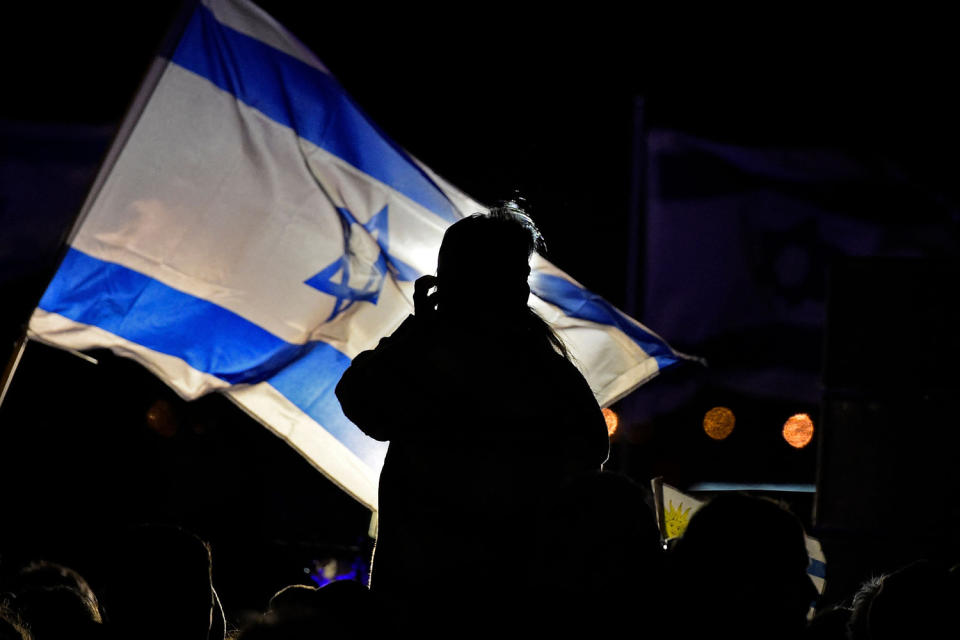Latino Jews grieve, worry as attack in Israel puts close family ties in focus
Fernando Russek, 51, a Jewish resident of South Texas who was born in Mexico, spoke with urgency and strength about "people on the side of good" standing with Israel and speaking out against the attack by Hamas.
But he couldn’t maintain the bravado as he disclosed that his daughter is fighting in the war because she is a captain in the Israeli army and that his brother, a reservist, was reactivated two weeks before he was to have opened a restaurant in Israel.
“I am like a father — and like any brother,” Russek said when he was asked how he was coping.
The gruesome violence that unfolded when Hamas staged a surprise attack along the Gaza border in Israel and the current state of war have put into focus the Latino Jewish diaspora and the interconnected nature of families, friends and cross-cultural ties among the U.S., Latin America and Israel.
“There’s literally thousands of Latinos who are Jewish,” said Rabbi Peter Tarlow, the executive director of the Center for Latino-Jewish Relations, who’s based in College Station, Texas. “Like anyone else in the Jewish community, this is personal. You know, it hits home. Many people in the Jewish Latino community have been to Israel. Many people have friends. You can go to cities in Israel and you hear lots of Spanish. … Lots of people have relatives in Israel.”
Russek’s daughter was born in the U.S. but went to live in Israel 15 years ago, and his brother returned several years ago. Russek said he gets to talk to his daughter once a day and recently got to talk to his brother, but he isn’t sure when or whether he’ll get to speak to him again.
“To my brother, I talked to him. I asked that God protects him. I asked him, ‘Don’t get captured. Fight to the end.’ He said, ‘Yeah, I don’t plan to,’” Russek said.
Follow live coverage from NBC News here.
Worried for their children, other young relatives
Like Russek in South Texas, Humberto Ismajovich, 58, told Noticias Telemundo that while his head is in Asunción, Paraguay, where he lives, his heart is in Israel, where his two sons are reservists. One of them, Uziel, 26, is already on the front lines, and a video he made as he says goodbye to his family has spread on social networks. “It is our time. That is why we came here,” he says on camera. Uziel was born and raised in Paraguay, but he is also a citizen of Israel, where he has lived for five years.

“Now that my son’s video has come out, many people have called me and expressed their support. But I tell them that war is always the last step. Unfortunately, it was our turn, but Israel has to defend itself,” Ismajovich said.
Colombians Sandra Montaño and her husband, Juan Hernán Hincapié, who live in Tel Aviv, have been desperately trying to find out what happened to Antonio Macías Montaño, their nephew, and his girlfriend, Ivonne Rubio Vargas. They were attending the Supernova music festival when Hamas started to attack. Antonio told his family by phone that they were running toward a bunker, but as of Monday, the family told Noticias Telemundo, they were missing.
“It’s stressful. We’re just waiting day to day without knowing what’s happened to them, do they have them, are they alive, are they dead,” Montaño said. Antonio has a 6-year-old daughter, and Ivonne has a 3-year-old son.
“That’s what hurts us the most,” Montaño said, her voice breaking.
One of the stories that has reverberated internationally is that of Brazilian Bruna Valeanu, 24, a student at Tel Aviv University who was also attending the Supernova music festival and was one of the hundreds of people killed at the event. Her family had recently moved to Israel and didn’t know many people, so they asked whether at least 10 people could attend her funeral; tens of thousands showed up.
‘Proud to be Jewish’
There are over 750,000 Latin American Jews, according to Brandeis University, and about half live in the U.S.
According to a 2020 Pew Research survey of U.S. Jewish adults published in 2021, 4% identified as Hispanic. But in a sign of changing demographics, nearly 3 in 10 (28%) Jewish adults under 30 (28%) identified as Hispanic, Black, Asian, other race or multiracial.
Some Latino Jewish families have immigrated to the U.S. in recent decades amid turmoil in Latin America.

In St. Louis, Daniel Platschek, 51, who immigrated to the U.S. from Venezuela over 30 years ago, is very active in the city’s Latino community, including the Hispanic Chamber of Commerce and a Hispanic leaders group.
“Because I am Jewish and people know that I’m Jewish, I make it even more of an effort to be part of the Hispanic community,” he said, as he tries to dispel stereotypes and forge connections among communities.
Like many other Latin American Jews, both his parents’ families had fled Hitler’s Germany and ended up settling in Uruguay, though Platschek was born in Venezuela, where his parents went to work.
“I grew up in a displaced place of the world where I was not supposed to be born, but I did, and I grew up there, and those are my roots,” he said. “l identify just as much to my Hispanic roots as to my Jewish roots.”
Asked about the attack on Israel, Platschek said he was “very adamantly against violence in any form, no matter where it comes from.”
But he reflected on something his late mother said.
"I remember my mom when she was alive, she would usually say: 'I'm not an observing Jew — but I will never deny the fact that I'm Jewish, because at the end of the day, I'm here, and nobody's going to take that away from me. I'm proud to be Jewish, and you know — my family made ridiculous sacrifices to survive.'"
Jacob Monty of Houston founded and runs the Center for Latino Jewish Relations along with Tarlow. Monty’s father was Jewish, and his mother is Roman Catholic; he grew up Roman Catholic.
The organization teaches Latinos and Jews about their shared heritage — many areas of Mexico and what is now New Mexico, for example, became home to Jewish families who were expelled from Spain in 1492 and had to convert or live as Catholics for survival, said Tarlow, an expert on crypto-Jewish history.
The center, Monty said, hosts trips to Israel, and it had one planned for Nov. 28. For now, it’s not canceling, he said, hoping the Israeli government will have taken control of the situation by then.
“It’s important for us as Latinos to condemn what’s happened,” he said. “Hamas is a terrorist organization. When I say condemn it, I'm not saying condemn Palestine. You can be pro-Palestine and criticize Hamas."
"We stand with Israel," he said.
Amid the worries over people’s safety and the tensions over the state of war, groups in the U.S. are mobilizing to offer support and raise money. In Texas, Tarlow was helping spearhead a fundraiser to help a small Israeli village on the Gaza border, where at least 18 residents were killed when Hamas attacked, he said.
"We’re trying to help them rebuild,” he said. “Almost all this money is coming from Latino donations.”
'I'm afraid'
In Washington, D.C., Dina Siegel Vann, the director of the American Jewish Committee’s Arthur and Rochelle Belfer Institute for Latino and Latin American Affairs, has worked for years to connect Latino and Jewish communities because of shared histories and geographies and mutual concern about issues such as immigration, bigotry and hate.
That work also involves taking Latinos to Israel. Since the attack, she has been wondering about the fate of a woman whose parents founded one of the kibbutzim that were devastated by Hamas and of another woman who was a potter and had visitors sign tiles with messages of peace that were then plastered into a wall.
Siegel also said the director of her group’s Jerusalem office was in the Israeli army and was most likely activated, along with her son.
Siegel said she has always been a “proud Jew” and has never kept silent about it. People tell her she doesn’t “look” Mexican, to which she responds, “I’m Jewish and I’m Mexican. Punto.” (Period.)
Siegel said she has seen Israel in many crises and has endured antisemitism in the U.S., but “for the first time, I’m afraid," she said. "I feel vulnerable, and my friends, we feel vulnerable.”
For more from NBC Latino, sign up for our weekly newsletter.
This article was originally published on NBCNews.com

